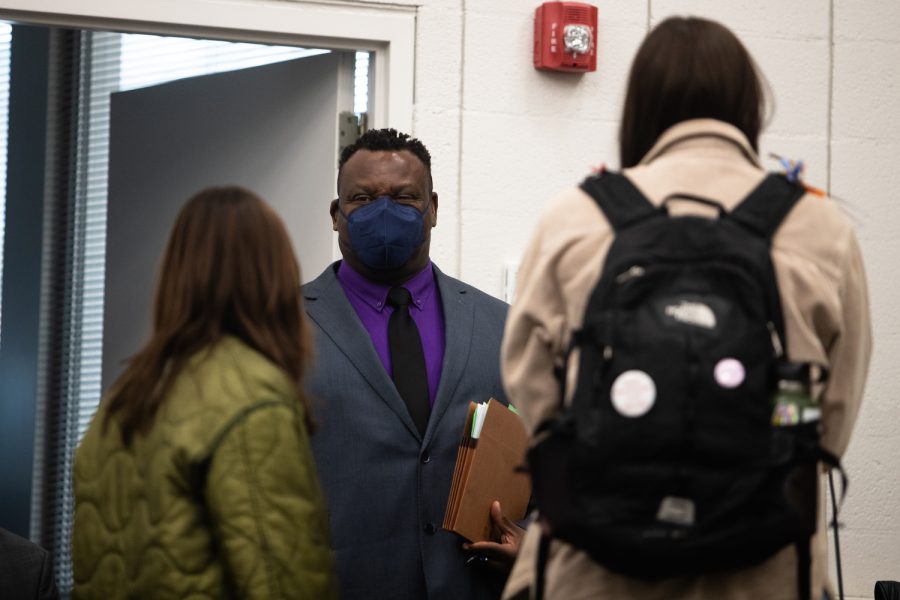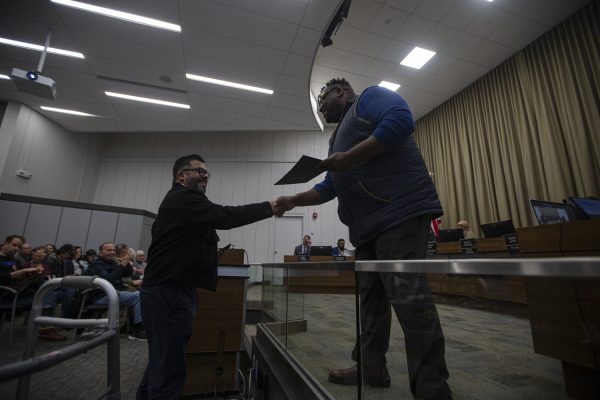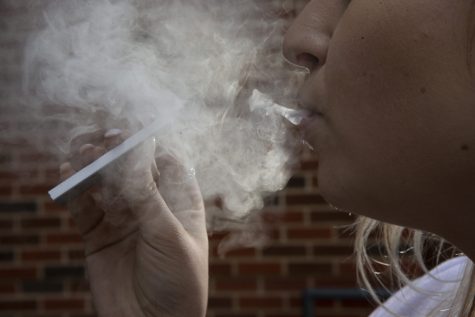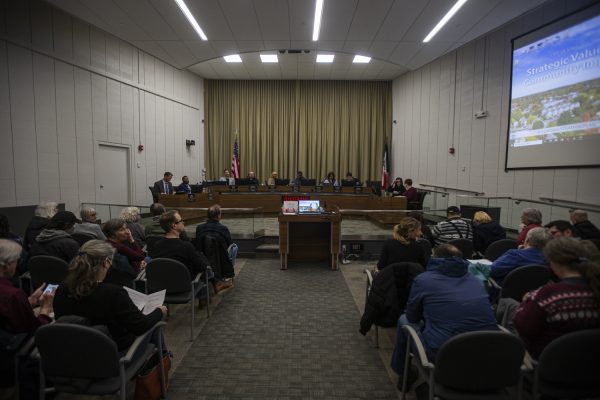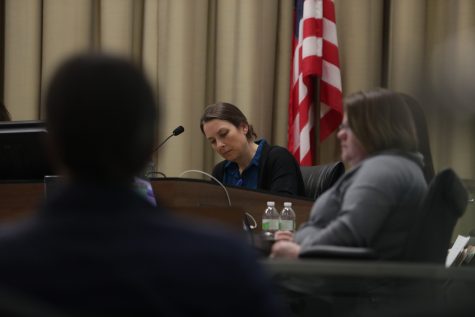Iowa City discussing possibility of climate action projects with leftover ARPA funds
The city’s Climate Action Commission discussed possible climate action projects possibly utilizing leftover ARPA funding.
Mayor Bruce Teague speaks with undergraduate student government members at an Iowa City City Council meeting at City Hall in Iowa City on Tuesday, May 3, 2022.
May 3, 2023
Iowa City’s Climate Action Commission discussed the possibility of future climate action projects with remaining funds from the American Rescue Plan Act at the commission’s meeting on May 1, but funds have not been promised for these projects yet.
Totaling $1.9 trillion dollars, ARPA was signed into law on March 11, 2021, by President Joe Biden to support a wide range of government initiatives and provide relief from the COVID-19 pandemic.
Through ARPA, $350 billion dollars in emergency funding was authorized for the Coronavirus State and Local Fiscal Recovery Fund. The money goes to state, territorial, local, and tribal governments nationally to support recovery from COVID-19.
The U.S. Treasury allocated $18.3 million to Iowa City. The city received half this amount in May 2021 and received the rest in May 2022.
According to the Iowa City’s government website, received funds must be obligated by December 31, 2024, and spent by December 31, 2026.
When the city initially learned it was receiving ARPA funds, the Climate Action Commission was asked for recommendations on projects related to climate action. Initial recommendations focused on energy efficiency interventions, which developed into a new energy efficiency grant program.
New incentives spurred on from the Inflation Reduction Act, which appropriates approximately $11.7 billion for programs approaching environmental justice and clean energy and could apply to previous energy-related initiatives recommended by the Climate Action Commission.
The act is poised to put the U.S. on a pathway to achieve Biden’s climate goals, including a net-zero economy by 2050.
Because of new incentives and investments, the city may have $500,000 in remaining ARPA funds for climate action projects, but the money has yet to be promised. However, the Iowa City City Council has asked for updated recommendations relating to new projects.
RELATED: Greenhouse gas emissions decrease in Johnson County
Iowa City Climate Action Coordinator Sarah Gardner explained the recommendations are only ideas at this point. Guaranteed funding has come from other initiatives, such as the Energy Efficiency Block Grant funds; however, it is unclear whether ARPA funds will be available.
“These projects are just ideas. It’s really a what-if scenario. The first thing the commission did was look at different suggestions that came up as they were brainstorming and as they were talking to community members to see how those projects might fit under the Climate Action Plan,” Gardner said.
Gardner said the commissioners looked at projects existing in the Climate Action Plan and looked for areas that overlapped with the intended purposes of ARPA funds.
“Once they narrowed them down to projects that could fit under the Climate Action Plan. [The commissioners] looked at the intended purposes of the ARPA funds and tried to find areas where they might overlap,” Gardner said.
Rachel Kilburg, Iowa City assistant city manager, wrote in an email to The Daily Iowan that Iowa City’s climate action projects are largely dictated by the city’s Climate Action Plan and Accelerating Iowa City Climate Actions Report.
“Any funding dedicated towards our climate action initiatives are helping to move these priorities forward,” Kilburg wrote. “If the City Council chooses to allocate ARPA funding to a climate action initiative, the Climate Action Commission discusses priorities for how they would recommend funds could be spent.”
Gardener said there are three ideas the commission has discussed recently, but there are still other ideas and future refinements. Some of the discussion included projects expanding the existing energy efficiency rebate program, an increase in resilience hub funding, and potential partnerships with local food processors or facilities.
Some of the new program ideas discussed during the commissions meeting in April included an e-bike voucher system and different transit initiatives. Second-Term Commissioner John Fraser said the projects recommended would be intended for long-term sustainability.
Additionally, Commissioner Michal Eynon-Lynch proposed piloting a program that could be utilized by the private sector, such as a commercial composting system or business. Neighborhood resilience projects such as urban farming to produce food and utilize compost was also discussed.
The possible e-bike program would prioritize transit-dependent households, which would receive a full voucher. To encourage active transportation, full vouchers would also be provided to riders 65 and older, and the general public would receive half-off vouchers through a lottery system.
The $500,000 has the possibility of funding more than 200 e-bikes.
Concerns relating to the e-bike program consisted of rides during the winter, availability, as well as safety and upkeep. Fraser noted that fewer people would ride e-bikes during the winter, and Commissioner Jamie Gade said determining eligibility could be burdensome.
Whether these projects are approved or remain ideas is still being determined. The eventual determination will be contingent on the amount of remaining ARPA funds Iowa City has at its disposal. However, climate action funding is still possible through other initiatives.
This includes a grant the city will receive sometime in the summer from the Environmental Protection Agency. The grant is for climate action, and $3 million is being distributed to all 50 states, and is part of the federal government’s larger Inflation Reduction Act.
The state of Iowa declined to take the money, but the money will still be made available to cities within the state, with the money to be split evenly amongst three cities. The three most populous cities were selected to receive this money: Des Moines, Cedar Rapids, and Davenport.
After the Quad Cities declined the grant, Iowa City was allowed to apply, which it did. It will now join Des Moines and Cedar Rapids in applying for the grant, with the three cities being aided by the East Central Iowa Council of Governments.
Jennifer Fencl, East Central Iowa Council of Governments environmental services director, said the organization would work as the lead entity in applying for the grant and has already been talking with the three cities involved to plan things out.
She also said this grant is something she has never seen before in her career, making it an important thing for cities to participate in.
“It’s kind of amazing to really have access and be given decent resources because none of this work is cheap, like hiring experts to do certain technical things, the amount of work and just sheer time it takes to get stakeholder input,” Fencl said.
According to the EPA’s website about the grant, the money can be used for things like staffing, supplies, training, among others. Fencl said after this initial grant, more money could be made available for climate action.



